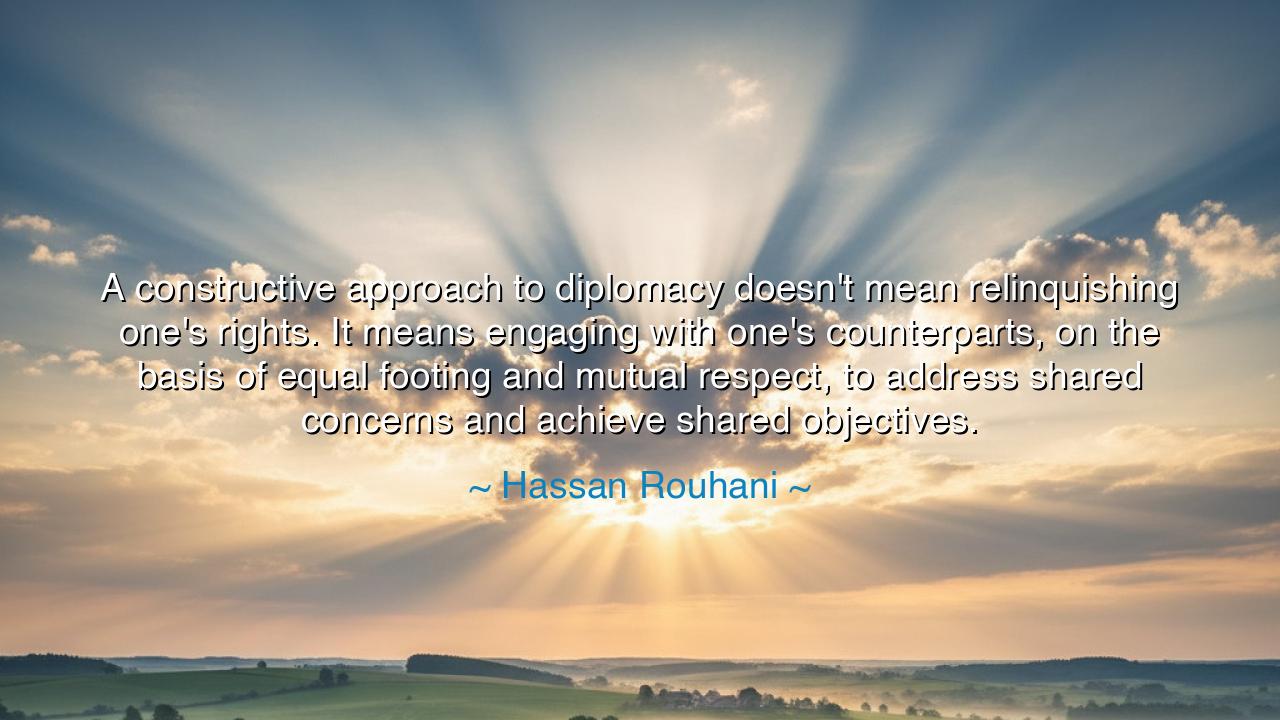
A constructive approach to diplomacy doesn't mean relinquishing
A constructive approach to diplomacy doesn't mean relinquishing one's rights. It means engaging with one's counterparts, on the basis of equal footing and mutual respect, to address shared concerns and achieve shared objectives.






"A constructive approach to diplomacy doesn't mean relinquishing one's rights. It means engaging with one's counterparts, on the basis of equal footing and mutual respect, to address shared concerns and achieve shared objectives." These words from Hassan Rouhani hold within them a profound lesson about the art of diplomacy, negotiation, and respect. Rouhani’s statement reminds us that diplomacy is not about compromise or weakness, but about finding common ground with others while still upholding one’s own principles and rights. True diplomacy requires both the willingness to engage and the strength to preserve dignity, recognizing that it is not through submission that progress is made, but through mutual respect and collaboration.
In the ancient world, the concept of diplomacy was often deeply tied to the idea of honor and power. The Greeks and Romans were skilled in the art of statecraft—negotiating treaties, forging alliances, and engaging in warfare with the understanding that diplomacy was often the key to preserving peace. Pericles, the great Athenian statesman, understood that a powerful state does not simply impose its will but negotiates from a position of strength and respect. He crafted alliances and engaged in diplomacy with a keen sense of equality—knowing that lasting relationships, whether with allies or rivals, were based on shared interests and mutual understanding. This was the essence of constructive diplomacy in the ancient world: engaging in respectful dialogue without losing one’s sovereignty or rights.
The Romans took this principle even further with their concept of pax romana, a period of peace and stability that was achieved not by total dominance, but by creating a network of alliances built on mutual benefit and respect. Rome’s ability to negotiate treaties with surrounding tribes, kingdoms, and empires was rooted in a recognition that mutual respect and shared objectives were the foundations of long-term peace. The Roman Senate, despite its political chaos and intrigue, often understood that lasting agreements could only be forged on the basis of equality and mutual interest, where all parties recognized each other’s sovereignty and rights. Rouhani’s statement is a modern echo of this ancient wisdom, where diplomacy is seen as a tool not for submission, but for collaboration and shared goals.
Consider the example of Cyrus the Great, the founder of the Persian Empire, who practiced diplomacy through a benevolent approach that respected the cultures and beliefs of the lands he conquered. Rather than imposing Persian rule through force alone, Cyrus was known for his tolerance and respect for the people under his reign, allowing them to maintain their own religious practices and governance. This constructive diplomacy won him the respect of many nations and people, leading to the peaceful expansion of his empire. Cyrus’s approach was rooted in the belief that true power lies not in the domination of others, but in the ability to engage with respect, building relationships that benefit all parties involved. His story is a powerful example of mutual respect in action, showing how even the most powerful rulers can engage in diplomacy that preserves both their own sovereignty and the rights of others.
In more recent history, Nelson Mandela is a figure whose constructive diplomacy and ability to engage on equal footing with adversaries left a lasting legacy. After years of imprisonment, Mandela emerged not with a desire for vengeance but with the conviction that only mutual respect and cooperation could heal the divisions in South Africa. His negotiations with the apartheid government were based on equality—recognizing that both sides had legitimate concerns that needed to be addressed for the sake of the country’s future. Mandela’s commitment to shared objectives, despite the historic oppression faced by black South Africans, exemplifies the kind of diplomacy Rouhani speaks of—engaging with others to find common ground, while never relinquishing the fundamental rights of those who were oppressed.
The lesson here is clear: diplomacy is not about giving up what is just and right in order to make peace. Rather, it is about engaging in honest dialogue, standing firm in your principles, and finding common ground on which to build respectful relationships. Whether in politics, business, or personal interactions, we must approach others with the same respect and understanding that we wish to receive. True diplomacy is built not on domination or coercion, but on a willingness to collaborate and work towards shared goals, even when the path is difficult.
In our own lives, let us strive to embody the principles of constructive diplomacy. We should engage with others—not as adversaries to be defeated, but as partners in progress, whose concerns and rights are equally valid. We must remember that strength in diplomacy comes not from imposing our will, but from the ability to stand firm in our own beliefs while also seeking the common good. In every negotiation, whether in personal relationships or larger endeavors, we must be prepared to listen, to respect, and to find solutions that are rooted in mutual respect. This is the true essence of constructive diplomacy—it is a tool for building lasting peace and shared success through the wisdom of respect and collaboration.






AAdministratorAdministrator
Welcome, honored guests. Please leave a comment, we will respond soon